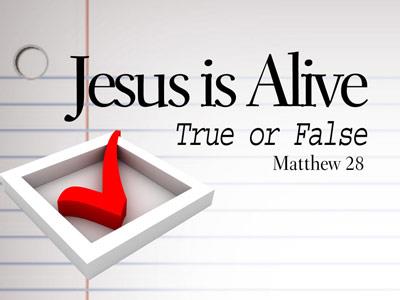-
The First Fruit
Contributed by Samuel Stone on Nov 28, 2017 (message contributor)
Summary: Paul addressed the case for resurrection at Corinth.
1 Cor. 15:12-20: Now if Christ is proclaimed as raised from the dead, how can some of you say there is no resurrection of the dead? 13 If there is no resurrection of the dead, then Christ has not been raised; 14 and if Christ has not been raised, then our proclamation has been in vain and your faith has been in vain. 15 We are even found to be misrepresenting God, because we testified of God that he raised Christ—whom he did not raise if it is true that the dead are not raised. 16 For if the dead are not raised, then Christ has not been raised. 17 If Christ has not been raised, your faith is futile and you are still in your sins. 18 Then those also who have died in Christ have perished. 19 If for this life only we have hoped in Christ, we are of all people most to be pitied.
20 But in fact Christ has been raised from the dead, the first fruits of those who have died.
Several years ago at a passion play an incident took place during Jesus carrying the cross. A man in the audience was heckling the character playing Jesus, throwing out jeers, taunts and dares. Finally the character could no longer tolerate the heckler, he dropped the cross and went over and punched out the man. The director was aghast and after the play pulled the actor aside and told him in no uncertain terms was he ever to do that again. But the next night the same heckler was back and again the same thing, Jesus this time had to be restrained. The director called the actor in and gave him an ultimatum of either quitting or keeping his composure. The young actor assured the director he would keep himself under control. The third night, the heckler was present again and taunted even stronger than the two previous nights. The man playing Jesus rose to his full stature, gritted his teeth and told the heckler, "I’ll see you right after the resurrection." (Mark Sutherlin)
In today’s scripture lesson, Paul was addressing a problem at the church in Corinth. It seems that some of them don’t believe in the resurrection of the dead. Paul says in verse 12, "Now if Christ is proclaimed as raised from the dead, how can some of you say there is no resurrection of the dead?" Some people in Corinth seem to believe that death is the end of life and there is nothing on the other side of death.
The city of Corinth was a metropolitan city and it was filled with many Roman and Greek intellectuals that found resurrection too hard to believe. For some Greek and Roman philosophers, that believes in the immortality of soul, the idea of the resurrection of bodies seemed unacceptable. Who wants to come back this body? It is such an encumbrance to come back in life into these bodies after seeing the sick bodies, dead bodies, raped bodies, tortured bodies, violated bodies.
Obviously, the Corinthian church was affected by this kind of thinking, so they thought the resurrection must be in our souls, or in spirits, not in bodies. Even in Judaism, there were Pharisees that believed in the resurrection of the dead on the final judgment day, and there were Sadducees that didn’t believe in resurrection at all.
A for Paul there was no reason for him to believe in Jesus Christ, in fact he went about persecuting the Christians, until one day he encountered the risen Christ face to face. To Paul, his entire faith in Christ was based on the resurrection of Christ, nothing more and nothing less. And there is a connection between the resurrection of Jesus Christ and our bodily resurrection one day.
So he says to the Corinthians, "You guys preached the resurrection of Jesus Christ, but you don’t believe the resurrection of the dead? This is not the good news that the apostles and I have been teaching you. You guys must believe Jesus resurrection was an unrelated miracle, that doesn’t have anything to do with us." To Paul, there is an inseparable connection between the resurrection of Jesus Christ and our own resurrection that is to come.
In the next verse he said, "If there is no resurrection of the dead, then Christ has not been raised;" See the good news Christ told him to proclaim is that whatever happened to Christ is something natural to human beings. If there is no resurrection of the dead, there would be no resurrection of Christ. In other words, whatever is possible in Christ is possible in us. The resurrection of Christ is the precursor to our own resurrection. Later it us the word "the First Fruit," indicating that Jesus is the first fruit and we are the following fruits.

 Sermon Central
Sermon Central



